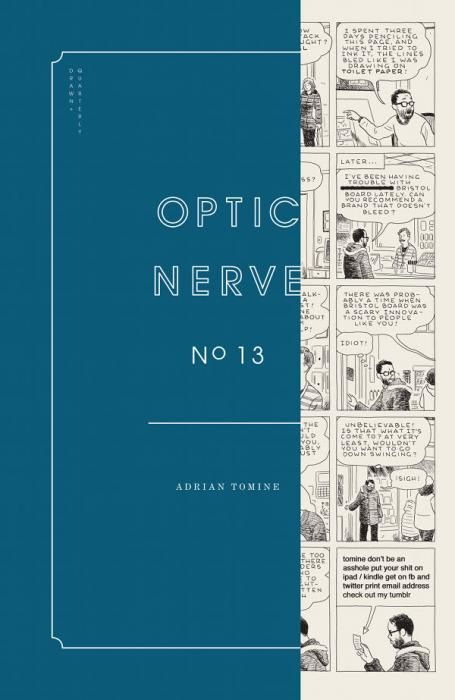The release of a new issue of Adrian Tomine's "Optic Nerve" is always cause for celebration. It's been close to two years since the last issue, and "Optic Nerve" #13 follows its (long) lead by containing two feature stories and a one-page autobio strip.
The first piece -- a black and white strip entitled "Go Owls" -- is fairly close to Tomine's typical subject matter, which someone neatly defines in the letter pages as "assholes falling in and out of love". It's a story about emotionally damaged people in love, and tracks the highs and lows of an abusive relationship between them, exploring what happens when two people who can't even look after themselves, try to look after one another.
It's not what you'd call a feel-good story, but it is powerful in its complexity. What makes it truly work is the lack of judgement Tomine passes on his characters. Rather than writing stories about bad people, he writes about people living with bad decisions. As heavy as that sounds, Tomine doesn't make it relentlessly grim, and the story is peppered with moments of comedy and dark humour that balance out the more shocking moments.
The second story, "Translated, From the Japanese" is in full color, and closer to being an illustrated prose piece than a conventional comic. The illustrations are nothing short of beautiful -- design-based, but not detached or cold with it. Each panel is a snapshot of a woman's plane journey from Japan to America with her young son, shown from first-person perspective and juxtaposed against the text of a diary entry looking back on the events depicted. It manages to be technically stunning and elegiac at the same time, reminding us why Tomine is considered a master of the form.
The final piece -- a customary moment of autobio -- is the closest the issue gets to outright comedy as Tomine rails against the rise of digital media and the dying of the high street. It recalls the instalment found in the previous issue where Tomine lamented the decline in status of the "floppy" comics format, as Tomine wrestles with times changing faster than he can keep up with. It's perhaps unusual to see the light-hearted moment used as a lead-in to a comic, rather than as the palate-cleanser at the end, but the issue doesn't suffer for it. Again, the story's strength is that Tomine doesn't present himself purely as a noble champion raging against the march of progress -- he's careful to show both sides to each argument, particularly his own uncertainty.
As usual, the only problem with an issue of "Optic Nerve" is that it's over too quickly. Still, after wondering about the relevance of the format in issue #12, two years later he's made sure there's a solid argument for its continued existence right here. Thoughtful, accomplished and deeply layered. It's as good as a comic gets.

